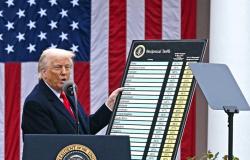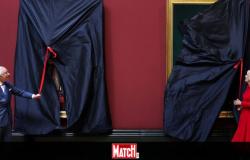The new tax desired by Trump constantly the American cinema.
AFP
Skepticism reigns in Hollywood in the face of customs duties of 100% wanted by Donald Trump on films produced outside the United States, an idea that professional and experts consider to be unsuitable for the needs of American audiovisual industry.
“It makes no sense,” Jonathan Handel told AFP. This specialized lawyer recalls that many American productions, from “James Bond” via the “Impossible Mission” saga, are turned abroad for obvious creative reasons.
“If a waterfall provides that Tom Cruise climbed the Eiffel Tower, what are we supposed to do?” He wonders. “Film that on the replica of the Eiffel Tower in Las Vegas?” It’s just absurd. “
Donald Trump said on Sunday that his government was starting “immediately the process of establishing customs duties of 100%” on the films broadcast in the United States but produced abroad.
The announcement has plunged industry into uncertainty: studios see their shares fall on the stock market, unions are trying to understand this decision, especially if it also applies to series. And everyone wonders if it is even applicable.
A film “falls in intellectual property”, points out Mr. Handel. “You can buy a movie ticket, but you don’t buy a movie like you buy a garment or a car.”
And customs duties “would do more harm than good,” said the lawyer: “This would have the consequence of reducing production, increasing the cost of films, reducing the number of films available for cinemas and streaming platforms, which would harm distribution”.
Sow confusion
The presidential message caused crisis meetings in Hollywood, according to the specialized press. “I see no other objective than to sow confusion and divert attention,” comments the manager of a large American distributor with the Deadline site.
“Hopefully this will only encourage American states to implement the essential increases in their tax credits as soon as possible,” he adds.
The California Democratic Governor seized the ball, offering Trump to set up a federal plan of $ 7.5 billion to support the sector, in the form of tax credit. “California is totally favorable to the idea of attracting more filming,” said Gavin Newsom, quoted by the New York Times.
Because if the remedy proposed by Donald Trump divides, the diagnosis of an American Moribonde audiovisual production is widely shared.
Since the historical strikes of actors and writers who paralyzed the industry in 2023, Hollywood has struggled to restart.
In Los Angeles, the number of filming days reached a historic low in 2024 – if the complete frost caused by the pandemic in 2020 is excluded.
This is notably due to the relocation of many productions, which studios are increasingly running in countries offering them attractive tax advantages such as Thailand, Hungary or South Africa.
Australia, which also uses these incentives, said on Tuesday by the voice of its Minister of Foreign Affairs Penny Wong that it always wanted to make “formidable films” with the United States
With Deadline, a financier of American cinema says he is “agree with the objective” of Mr. Trump. But “it is obvious that these are tax credits that need, not customs duties,” he said. “Customs duties will only be due to what remains of industry.”
Balanced federal response
A White House spokesman assured on Monday “that no decision was made” and that “the administration explores all the options”.
“I am not trying to harm the industry, I want to help him,” Donald Trump told the press, announcing that he was going to meet representatives of the sector soon.
The studios have so far kept reacting. As for unions, they adopt cautious language.
That of the actors, the SAG-AFTRA, “supports efforts to increase cinematographic, television and streaming production in the United States” and is “impatient to know more”.
“The United States needs a balanced federal response to bring jobs back into cinema and television,” said the IATSE, the Hollywood technical professions union.
(afp)








